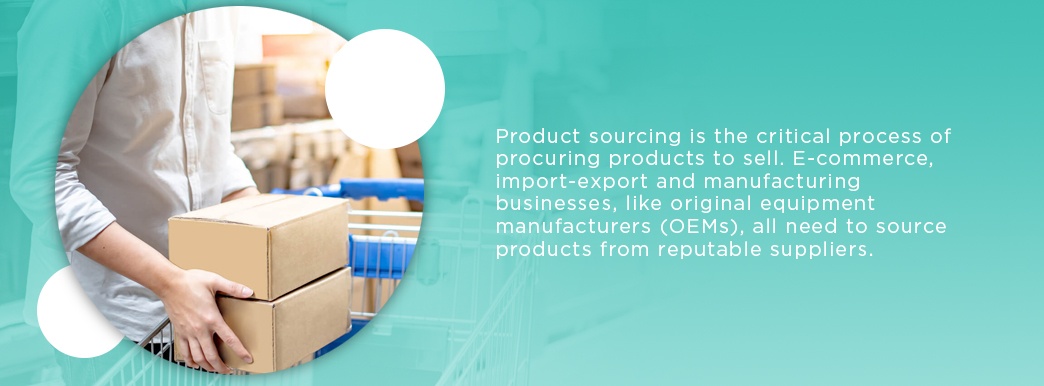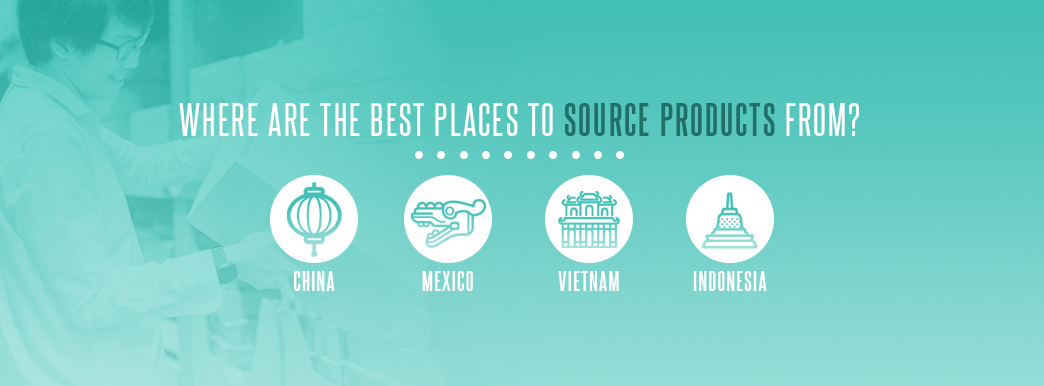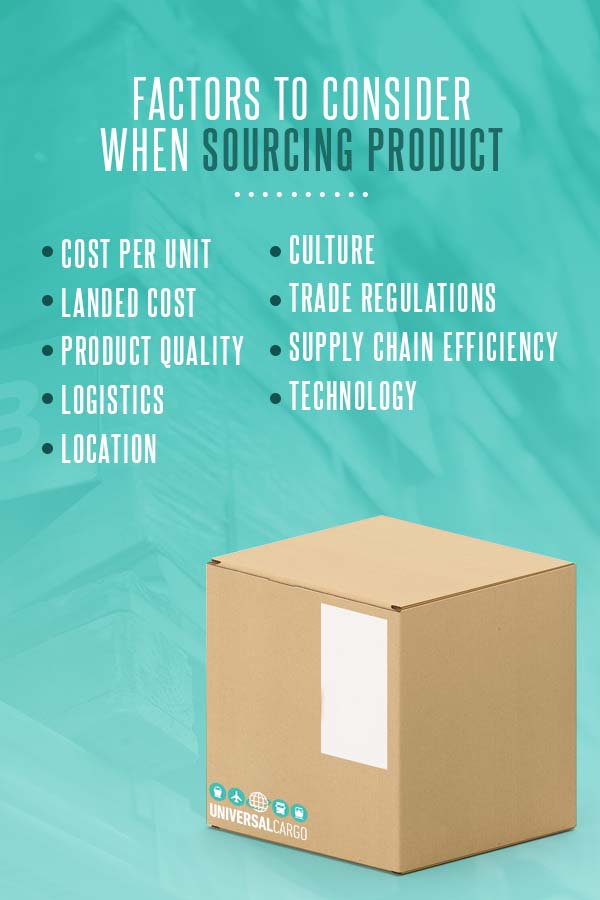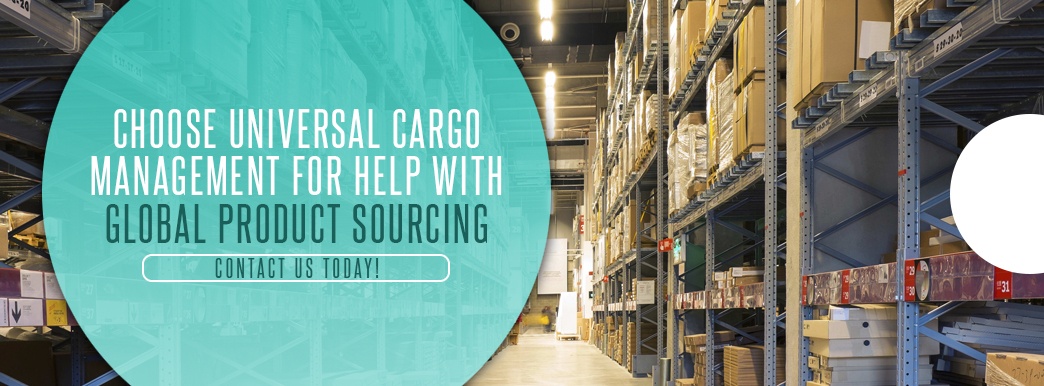Guide to Business Product Sourcing
Being able to source high-quality, affordable products to sell to your customers is the lifeblood of all commerce. Without the ability to source products from a variety of reputable suppliers, our global economies would stagnate, and businesses wouldn’t be able to thrive. Business product sourcing is a staple of commerce, but it can be a complicated undertaking. With so many options available today from manufacturers around the world, it can be hard for businesses to know what kinds of products to source and from where.
In this guide to global product sourcing, we’ll cover the fundamentals of product sourcing, where to source high-quality products abroad and what to consider when choosing product sourcing services.
 What Is Product Sourcing?
What Is Product Sourcing?
Product sourcing is the critical process of procuring products to sell. E-commerce, import-export and manufacturing businesses, like original equipment manufacturers (OEMs), all need to source products from reputable suppliers. But businesses can’t just source any products. They need to find high-quality, good-value products that their customers need and want to buy. Without products to sell, you don’t have a business.
Product sourcing may seem like a straightforward process — you conduct market research, find a reputable supplier and place an order. But there’s much more to it than that. Product sourcing requires planning and negotiation to ensure you get enough product at the right price and from the right supplier. Product sourcing is now a global endeavor, with many businesses ultimately finding products of high value from international markets. While businesses can source products themselves, they may not be getting the best price or the best value considering other cost influences like freight, shipping times, tariffs and other trade barriers.
In most cases, your best bet as a business is to hire a professional product sourcing company or brokerage. These companies handle the research and help you easily facilitate trade. Global product sourcing services investigate potential suppliers from around the world, finding you the best deal. They help you get your desired product from the manufacturer to your local warehouse, taking this responsibility off your shoulders.
Some product sourcing services specialize in certain types of products, while others may specialize in certain geographic regions, such as China product sourcing. Professional product sourcing companies specialize in establishing trade relationships with global suppliers. As a result, they’ve earned tremendous purchasing power, and they pass on these cost savings on to their customers. Product sourcing providers help you find the right products at the best price, but they may also provide third-party inspection services to ensure that the products you’re sourcing are of the highest quality and safety standards and that manufacturers adhere to requirements. Global product sourcing companies may also provide services like brand consulting and product packaging.
 Where Are the Best Places to Source Products From?
Where Are the Best Places to Source Products From?
We live in an increasingly globalized world, interconnected by a vast, open network. Because of how easy it is to facilitate trade between countries and continents, many U.S. businesses today look to source products overseas. Global product sourcing is highly accessible and has leveled the playing field for small and medium-sized businesses to be able to compete and grow their businesses. This is in large part due to the ability to source products at significantly lower prices abroad.
If you’re looking at sourcing a new product line or searching for different markets to source better value products from, then it’s important to look at several potential places. Internationally, there are a few key regions that supply products and are excellent places to begin your product sourcing search. Here are a few countries to look to for global product sourcing:
- China: China is one of the most significant global contributors to the product-sourcing landscape and is known for its abundance of affordable and diverse products. China is the United States’ leading global trading partner. The most commonly imported goods from China to the U.S. are consumer electronics followed by machinery. U.S. businesses also import significant amounts of bedding and furniture, toys and sports equipment, as well as plastic components from China.
- Mexico: In recent years, Mexico has become an emerging market for product sourcing. It now competes heavily with China for similar products, as wages in China are steadily increasing. Businesses can source a plethora of high-quality and affordable products from Mexico, including petroleum derivatives, textiles and manufactured goods.
- Vietnam: Vietnam is an important trading partner for the West as it has a developing economy driven by its manufacturing sector. Many businesses pursue trade partnerships with Vietnamese product suppliers because of the array of high-quality goods the country has become known for. The leading categories of goods sourced from Vietnam include electronic machinery, textiles, footwear and agricultural products.
- Indonesia: Indonesia has a growing economy backed by a massive labor force. It’s conveniently located for global shipping, making it a strategic trading partner for U.S. businesses. Indonesia is known for its agricultural exports, including seafood and coffee. It’s also an exporter of apparel as well as rubber and other commodities.
Where you choose to source your products from depends on your business goal. If your objective is to keep your product costs as low as possible, then in many cases, China will be the cheapest source for products due to their vast industrial infrastructure that has created incredible economies of scale.
If you’re looking to source products nearby to reduce freight costs and shipping times, then Mexico may be your best choice due to its proximity to the United States. Additionally, Mexico and the United States have an open trade agreement, reducing trade barriers and incentivizing import-export relationships within North America.
Another factor to consider when deciding where to source your products from is the category of product you’re sourcing. China is known as the dominant marketplace for sourcing electronics and manufactured goods, while Vietnam and Indonesia are becoming known as experts in textiles. When deciding where to source products from, always get clear on your business goals and product objectives to narrow down the right supply marketplace.
China Product Sourcing and Our Economy
China is a global economic powerhouse and has the second-largest GDP in the world after the United States. Contributing to nearly 20% of the world’s GDP, China’s economy is driven by manufacturing and agricultural activity. After China embraced a capitalist economy in the 1970s, the country began investing heavily in commerce and trade, establishing the economic infrastructure necessary to bolster its prosperity. With a minimal cost of living, Chinese wages have remained relatively low, making it economically viable for Western countries to buy Chinese-made products.
According to the Office of the United States Trade Representative, the United States imported $539.5 billion worth of goods from China in 2018. Over 21% of our country’s imported goods came from China, a figure that has been steadily increasing since 2008. Importing goods from China allows U.S. businesses to keep their overhead costs low and make products more affordable to average American consumers.
Overall, the U.S.-China trade relationship is a win-win scenario for both countries. American demand for consumer goods provides an opportunity for China to continue manufacturing products, and China’s low wages keep American manufacturing costs low. Without imported goods from China, the U.S. economy would struggle to maintain an affordable standard of living for the average American. More U.S. businesses would be forced to source products from elsewhere, including more expensive markets, such as the domestic manufacturing market. Inevitably, higher production costs would cause products to increase in price, making daily life more expensive for Americans.
Continued trade with China is critical to maintaining a mutually beneficial situation for both American and Chinese citizens. Both economies need to prosper and maintain a sustainable rate of growth for the relationship to continue to work. When China’s economy grows too rapidly, it strains Western economic interests that rely on low manufacturing costs to continue to keep products affordable for consumers. When America’s economy suffers, consumer demand decreases, meaning fewer products get sourced from China, leading to economic decline there.
Because of how important Chinese manufacturing is to the U.S. economy, businesses are encouraged to investigate the Chinese market when sourcing products to manufacture their goods. Many businesses import goods manufactured in China to sell directly to American consumers. In other cases, U.S. businesses ship raw materials to China where they’re manufactured into end products, which are then shipped back to the U.S. At Universal Cargo, we serve many U.S. businesses that rely on China to source affordable, high-quality products. Our clients find long-term, cost-effective relationships with Chinese suppliers that help them deliver the products their customers need. By working with the right China product sourcing company, U.S. businesses find the best products at the best price.
Factors to Consider When Sourcing Product
If you’re a U.S. business owner considering outsourcing your product manufacturing globally, there are many benefits this approach can afford you. Global product sourcing helps you keep your manufacturing costs down, allowing you to reinvest your capital into other business areas, such as human resources and innovation. When venturing into the world of business product sourcing, it’s important to be very informed about your options and all the factors that go into international trade. When you’re looking to source products from around the world, consider these important factors:

- Cost per unit: One of the biggest factors businesses look at when choosing a product source is the cost per unit. In many cases, this price can be negotiated based on volume. The more products you order, the lower the cost per unit will be. These rates vary by supplier, so it’s critical to look at several different suppliers to determine the best cost per unit.
- Landed cost: Cost per unit isn’t the only cost factor to look at. A product might have a lower cost per unit, and you might be able to order it in higher volumes, but calculate what the final cost will be after factoring in expenses like freight, tariffs, insurance or brokerage fees. Often these are location-dependent costs, but they can vary by supplier.
- Product quality: Product quality is of high importance for several reasons. Firstly, you want your customers to receive goods of high value that they’ll be happy with and purchase again. Secondly, products must reach a certain quality standard to be considered safe enough to import into the country. Always source products from a reputable supplier and ensure that goods are thoroughly tested and meet safety standards.
- Logistics: Ensuring you can get your products from the supply point to your location is critical. When choosing a supplier, you must ensure that there is the local infrastructure available to get your shipment from the manufacturing plant to the nearest international port.
- Location: Your total cost depends a lot on the location where your products are sourced from. Location affects transportation times, which can drive up costs. It also produces variables like seasonal fluctuations and weather changes, which can interrupt your supply chain and negatively impact your business.
- Culture: It’s easy to overlook culture as a factor in where you source your products from, but it plays a bigger role than you might realize. For example, in China, credit cards aren’t standard. To pay for products, you need to initiate a wire transfer, which is the typical payment method for the country. Additionally, language barriers are always a challenge, as well as local holidays, which differ from the United States.
- Trade regulations: Each country has its own set of regulations on exports, which will impact which products you can source and how much it will cost. Additionally, some trade barriers can be time-consuming to overcome, which can delay shipments and even incur expensive penalties. To avoid these snags, it’s critical to work with a freight forwarding company with vast experience in the country from where you are sourcing products.
- Supply chain efficiency: When sourcing products from overseas, it’s critical to know how long it will take for products to become available. If it takes you too long to get your goods to market, your competitors can take advantage of these supply chain delays and you may lose market share.
- Technology: It’s easy to take technology for granted, but not all parts of the world have reliable information technology networks. It’s important to source your products from a supplier that has the technological infrastructure in place to remain in regular communication with you about your product orders and be able to respond promptly when challenges arise.
 Choose Universal Cargo Management for Help With Global Product Sourcing
Choose Universal Cargo Management for Help With Global Product Sourcing
Global product sourcing is a critical business advantage, allowing you to import high-quality, affordable goods so you can reach more customers. But navigating international trade with product suppliers abroad can be a complex and time-consuming process. That’s why it’s critical to partner with a product sourcing service provider that can handle this process for you.
Universal Cargo is a full-service international shipping and logistics service company with over 30 years of experience in global import-export markets. With strategic partnerships in China, Vietnam, Mexico and Indonesia, Universal Cargo can help you reach the right suppliers to solve your product sourcing problems.
For more information on global product sourcing, contact Universal Cargo today. Call us at 1-866-826-2276 or contact us online to request a rate for commercial shipping.



